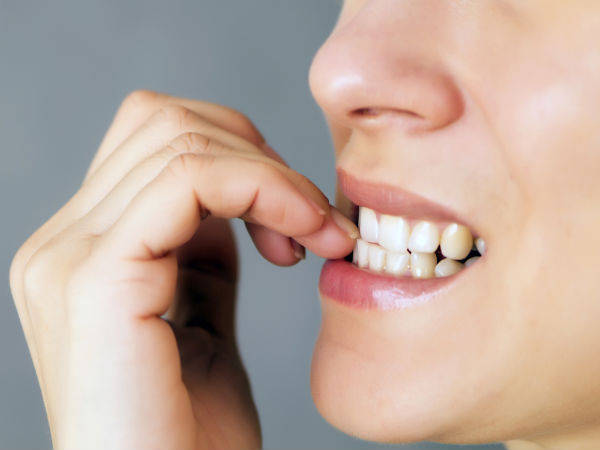當前位置: Language Tips> 雙語新聞
Do You Bite Your Nails? It Might Mean You're A Perfectionist
分享到

Are you mindlessly twisting your hair or biting your nails as you read this article? New research from the University of Montreal suggests that compulsive behaviors like these might say more about your personality than you think.
看這篇文章的時候,你是不是正在無意識地繞弄頭發或者咬指甲?蒙特利爾大學的最新研究表明,這些強迫行為或許更能表現你的性格。
People who are generally impatient, or who get bored or frustrated easily, are more likely to engage in repetitive body-focused behaviors such as skin-picking, nail-biting or eyelash-pulling, the researchers found.
研究人員發現,那些一般缺乏耐心、容易感到無聊或是沮喪的人更可能有重復性的身體強迫行為,比如抓皮膚、咬指甲或是拔睫毛。
The study, published in the March issue of the Journal of Behavior Therapy and Experimental Psychiatry, points to perfectionism - a trait that can be more damaging than many people realize - as an underlying cause.
這份出版在《行為治療與實驗性精神病學》三月刊上的研究將這些行為歸為完美主義的潛在原因,完美主義比許多人想象的更具危害性。
“We believe that individuals with these repetitive behaviors may be perfectionistic, meaning that they are unable to relax and to perform task at a ‘normal’ pace," Dr. Kieron O'Connor, professor of psychiatry at the university and the study's lead author, said in a press release Tuesday. "They are therefore prone to frustration, impatience, and dissatisfaction when they do not reach their goals. They also experience greater levels of boredom.”
齊耳倫?奧康納博士是蒙特利爾大學精神病學教授,同時也是該項研究的第一作者。他在星期二媒體發布會上表示:“我們認為有這些重復行為的人可能比較追求完美主義,意味著他們不能放松或是以‘正常’的速度完成某項任務,因此,當他們未能達到目標的時候,比較容易感到沮喪、不耐煩、不滿意。還有,他們會更加覺得無聊。”
In the study, the researchers worked with 48 participants, half of whom regularly engaged in these types of behaviors. The other participants, who didn't engage in these behaviors, acted as a control group. The participants were asked questions about the extent to which they experienced emotions like boredom, anger, guilt, irritability and anxiety. Then, each participant was exposed to situations designed to provoke particular feelings (including relaxation, stress, frustration and boredom). In the boredom scenario, for instance, the subject was simply left alone in a room for six minutes.
在此項研究中,研究者選取了48名參與者,其中一半經常有上述強迫行為。另一半沒有這種行為的參與者作為對照組。研究人員詢問了參與者在何種程度下會經歷無聊、憤怒、愧疚、易怒、焦慮等這些情緒。然后,每個參與者都被置于已設計好的情景中,目的是激起特別的情感(包括放松、壓力、沮喪和無聊),例如,在無聊的情境中,研究對象會被單獨留在一個房間里待6分鐘。
Participants with a history of fidgety, body-focused behaviors reported greater urges to engage in those behaviors when they were feeling stressed and frustrated. But they didn't report feeling those urges while they were relaxing.
研究表明,有煩躁不安、身體強迫癥病史的參與者感到壓力大、沮喪時,會有更急切的愿望想要做出那些強迫行為。但是他們放松的時候,并沒有表現出這種急切。
If you do bite your nails from time to time, there's no need to worry - you're probably not doing much harm. In fact, the researchers say that such behaviors serve a temporary purpose when we're not able to channel our energy more productively.
如果你時不時會咬指甲,沒有什么可擔心的——這可能不會有太大的傷害。研究人員表示,事實上,當人們無法充分釋放自己的能量來做成一些事情時,這些行為可以暫時幫助人們排解。
"The positive effects of the habits are stimulation and a (maladaptive) way of regulating emotion," O'Connor said in an email to The Huffington Post. "What triggers the habit is largely frustration and impatience so the action substitutes for more constructive action."
“這些習慣的正面影響是刺激和(適應不良時的)情緒控制方式,”奧康納在寫給赫芬頓郵報的郵件中說道。“出現這些習慣很大程度上是由于沮喪和缺乏耐心,所以這些行為代替了更具建設性的行為。”
Vocabulary
twist hair:繞弄頭發
nail-biting:咬指甲癖
perfectionism:完美主義
underlying:潛在的
fidgety:煩躁不安的
maladaptive:不適應的
(譯者:余妍琳scnu,編輯 Helen,杜娟)
上一篇 : 《權力的游戲》王座坐便器
下一篇 : 你被“孕傻”騙了多久
分享到
關注和訂閱


電話:8610-84883645
傳真:8610-84883500
Email: languagetips@chinadaily.com.cn